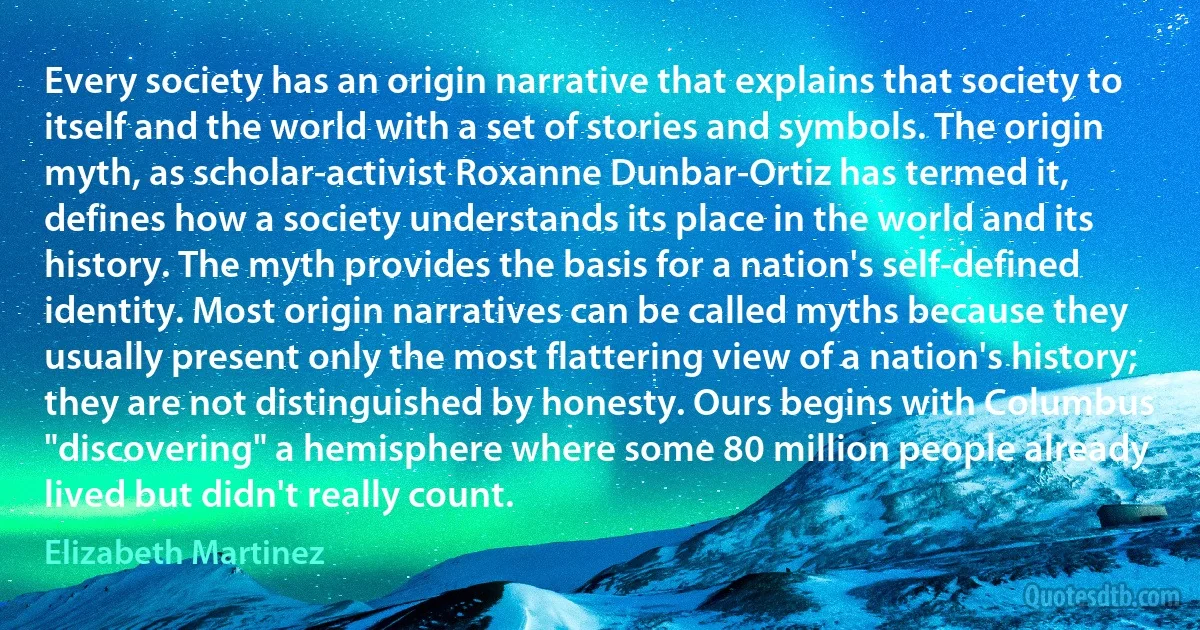
Every society has an origin narrative that explains that society to itself and the world with a set of stories and symbols. The origin myth, as scholar-activist Roxanne Dunbar-Ortiz has termed it, defines how a society understands its place in the world and its history. The myth provides the basis for a nation's self-defined identity. Most origin narratives can be called myths because they usually present only the most flattering view of a nation's history; they are not distinguished by honesty. Ours begins with Columbus "discovering" a hemisphere where some 80 million people already lived but didn't really count.
Elizabeth MartinezRelated topics
count discovering hemisphere history honesty myth narrative people place present set view worldRelated quotes
You cannot do anything without rousing the masses to action. A plenary meeting of the Soviet must be called to decide on mass searches in Petrograd and the goods stations. To carry out these searches, each factory and company must form contingents, not on a voluntary basis: it must be the duty of everyone to take part in these searches under the threat of being deprived of his bread card. We can't expect to get anywhere unless we resort to terrorism: speculators must be shot on the spot. Moreover, bandits must be dealt with just as resolutely: they must be shot on the spot.

Vladimir Lenin
George Orwell once wrote: "And it's not a matter of whether the war is not real or if it is. Victory is not possible. The war is not meant to be won, it is meant to be continuous. Hierarchical society is only possible on the basis of poverty and ignorance. This new version is the past and no different past can ever have existed. In principle the war effort is always planned to keep society on the brink of starvation. The war is waged by the ruling group against its own subjects and its object is not the victory over either Eurasia or East Asia but to keep the very structure of society intact."

Michael Moore
I refer to the misunderstanding of Soviet Russia as an aggressive power, militaristically and ideologically bent upon world domination 'seeing', to quote a recent speech of the British Prime Minister, 'the rest of the world as its rightful fiefdom.' How any rational person, viewing objectively the history of the last thirty-five years, could entertain this 'international misunderstanding' challenges, if it does not defeat, comprehension. The notion has no basis in fact... If Russia is bent on world conquest, she has been remarkably slothful and remarkably unsuccessful.

Enoch Powell
[Some of the] rules and articles of faith [of the western myth]:
Questions that cannot be answered should not be asked.
Knowledge and power are the twin pillars of human identity.
Knowledge consists of organized facts.
Sensation, intuition, and feeling are primitive, immature forms of thought.
Wealth is created by fabricating natural, raw materials into finished products; the production of goods is the basis of value.
Economics has replaced religion as the ultimate concern.
The chief motivation (eros) of human beings is to accumulate and consume.
Advertising and propaganda are the chief erotic sciences of the modern age.

Sam Keen
We learned about dignity and decency – that how hard you work matters more than how much you make...that helping others means more than just getting ahead yourself. We learned about honesty and integrity – that the truth matters, that you don't take shortcuts or play by your own set of rules, and success doesn't count unless you earn it fair and square. We learned about gratitude and humility – that so many people had a hand in our success, from the teachers who inspired us to the janitors who kept our school clean, and we were taught to value everyone's contribution and treat everyone with respect.

Michelle Obama
